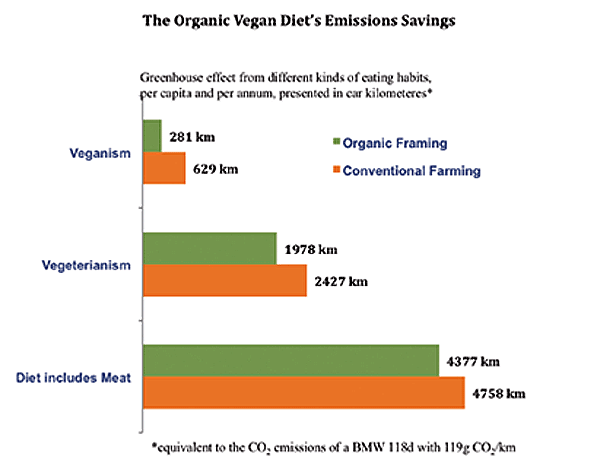-
Chapter 3. Organic Veganism to Heal the Planet > It is the Fastest and Greenest Solution
-
-
II. It is the Fastest and Greenest Solution
Cool the Planet Immediately
Marianne Theime, co-founder of the Party for Animals in the Netherlands, has outlined clearly the environmental gains of reducing meat in the diet. For example, if all Britons refrain from meat for seven days a week, that would be equivalent to turning half of the country’s 25-million households into zero-emission homes. For six days a week, it would be the same as the country’s 29-million cars being removed totally from the roads.

Data source: Foodwatch Organic: A Climate Saviour? The Foodwatch report on the greenhouse effect of conventional and organic farming in Germany. May 2009, p. X.
• Comparison with the Conventional Omnivore Diet
• An organic [meat-based] diet produces 8% savings in GHG emissions
• Ananimal-free, vegan diet produces less than 1/7 the GHG emissions of a meat diet—86% savings in GHG emissions.
• An organic vegan diet produces 94% savings in GHG emissions.101
—The Foodwatch report on the greenhouse effect of conventional and organic farming in Germany
[Therefore,] the greenest of all the green policy, the greenest of all the green action, the most compassionate, the most heroic, the lifesaving action, is the vegan diet.
The reason is based on the significant, planet-cooling effect of removing methane from the atmosphere, which happens when we switch to the organic vegan diet. And besides removing the harmful methane emissions, organic tilling methods can actually store 40% of the carbon back into the soil. So to be veg is a way to not only eliminate significant emissions, but to absorb even more carbon from the atmosphere.
And with that approach, we are working toward being able to save the world. Because the switch to the animal-free diet removes all the methane production and its associated pollutants, to say nothing of the animal cruelty, it will help reverse these planetary disasters, such as the tsunamis, the floods, storms, typhoons and the landslides, etc., etc.
In fact, the head of the United Nations Framework Convention on Climate Change, Mr. Yvo de Boer, already stated in June 2008 that “The best solution would be for us all to become vegetarians.” He meant vegans.
Be Vegan: the Greenest Lifestyle
[Stopping meat production] saves 80% of the total cost of US$40 trillion for reducing global warming; uses 4.5 times less land to grow food; conserves up to 70% clean water; saves 80% of the cleared Amazonian rainforest from animal grazing. A solution for world hunger: Free up to 3.4-billion hectares of land; free up to 760-million tons of grain every year (that is half the world’s grain supply.) Conserves one-third fossil fuel used for meat production; reduces pollution from untreated animal waste; maintains cleaner air; saves
4.5 tons of emissions per US household per year; stops 80% of global warming or more. The list goes on.
A study conducted in the United States found that organic farming preserves topsoil and keeps water bodies clean, and if used worldwide, would have the potential to absorb and store approximately 40% of all present-day, CO2 emissions each year. This would be a direct benefit to our Earth.
Other aspects of vegan, organic farming that are beneficial include things like crop rotation, mulching and natural fertilizers. Crop rotation means that a field is planted each season with different crops. This variety approach helps keep the plants healthy and also restores fertility and nutrients to the soil. Other methods such as mulching and even a new method called no-till organic farming help retain moisture and reduce soil erosion considerably.
So, in general, vegan, organic farming follows a philosophy of living in harmony with nature and protection for the planet and all beings. The methods employed support the natural balance between farming and the environment. Over time, the combination of this care and practice through the techniques available can go a long way toward restoring the balance from problems that may have arisen in the past.
Eating Local Produce and Eating Organic Meat?
Interestingly, studies show that eating locally is not as good as eating vegan. For example, scientists at Carnegie Mellon University calculated that a vegan diet reduced over seven times the emissions compared to a 100% local meat diet. So, eating vegan is better than eating local even.
In another study, Foodwatch in Germany found that switching from a meat diet to an organic meat diet saved only 8% of emissions, but switching to a non-organic, vegan diet, even non-organic, vegan diet, reduced 86% of emissions.102 So, we save the planet by being vegan. Even non-organic! So, actually, organic is good, local is wonderful, but the first step is at least being vegan, organic or not.
Even organic meat is actually not eco-friendly at all; it requires even more land, and more energy than the non-organic meat in meat farming. Can you believe that? So, it doesn’t even help to try to raise animals organically. The so-called “sustainable,” “free-range,” organic poultry, for example, needs 20% more energy and has a 20% higher, bigger impact on global warming than non-organic poultry farms. Think about that. So, we’ve been misled all the time.
|  |
|